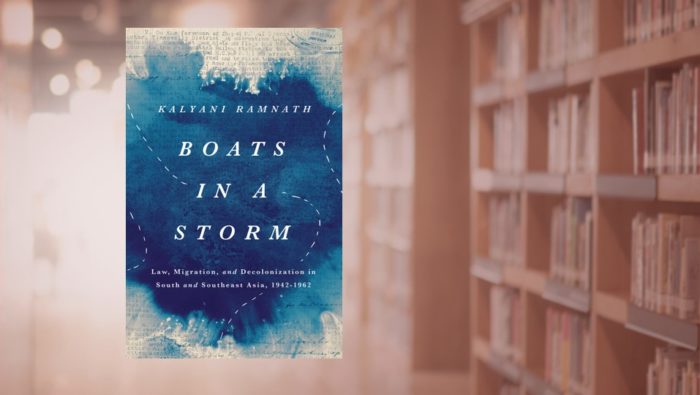
On A Sea of Paper

Modern South Asian history has often trained its lens on the process of decolonisation which, along with the partition of the subcontinent into India and Pakistan in 1947, left a lasting impact on contemporary nations of the region. Boats in a Storm: Law, Migration, and Decolonization in South and Southeast Asia, 1942–1962 by Kalyani Ramnath broadens these accounts of post-colonial legal history by drawing our attention to South Asia’s ‘other partitions’— the impact that the transition from Empire to nation-state had upon the flows of currency, capital, credit, and labour across South and Southeast Asia. Ramnath foregrounds the experiences of migrants from southern India in (then) Burma, Ceylon, and Malaya, and tells of their encounters with the law as they attempted to return to the rhythms of migrant life that they were familiar with.
Their stories are bookended by two landmark years two decades apart. The first is 1942, the year that Japanese forces occupied territory in Southeast Asia during the Second World War, causing a massive wave of wartime displacement as people fled to escape air raids and the prospect of capture. The second is 1962, the year a second wave of displacement occurred as territorial and citizenship boundaries in new nation-states were reworked, causing the repatriation and return of many Indian-origin migrants from Burma, Ceylon, and Malaya. In Part I, Ramnath focuses on the personal narratives that migrants told in legal cases they initiated to return to the homes they had left during the war or recover wealth they had lost. Through a close examination of disputes that range from breach of contracts, debt recovery, income tax residency determinations, contested wills, and citizenship registration applications, Ramnath shows how new nation-states defined their body politic and exercised sovereignty in these intervening decades not only through territory, but also by controlling flows of money and movement. The book shows how migrants across castes, classes, and religions navigated emergent legal orders, attempted to demonstrate attachments to their homes, and told origin stories of their communities’ migratory histories. Part II turns to consider other displacements in the region—the deportations of suspected communists from Malaya and their subsequent detentions in Madras, and the displacements of migrants following the 1962 military coup in Burma and the repatriation of Indian-descended plantation workers in Ceylon.
The book has two threads that come together across the different chapters. The first is on paperwork and bureaucracy, and the second deals with questions of political belonging. Ramnath creatively reads the archive to show how legal disputes were a way for migrants to tell personal stories that disrupted the stable categories of residence and citizenship that nation-states were invested in, showing how these legal fictions were at odds with the realities of migrant lives across the Indian Ocean. Migrants sought to establish their connections to their homes and contested state narratives in routine disputes as they looked to recover their wealth, avoid double taxation, remit money to their families, pass on their property, and apply for residency. In doing so, they were compelled to navigate haphazard and confusing bureaucratic systems, risking statelessness as national borders hardened. Notions of political belonging also took concrete institutional form at this time, and the loyalties of migrants were questioned as they were asked why they left in 1942, how often they visited India, if they had family and sent remittances there, and what their political affiliations were. Ramnath brings these themes together by showing us how claims of political belonging were contested in and through paperwork, and so the archive offers a window into how migrants themselves experienced decolonisation as dislocation.
These disputes are skilfully narrated, bringing together a wide range of encounters with the law to help us see their significance in a single frame. A valuable contribution of this book to socio-legal scholars is in demonstrating the anxieties at work in each of these places as they struggled to fashion new nation-states. Different identities—racial, ethnic, linguistic, political, and religious—were mobilised and constructed in this process. An example of this was the distinction that came to be drawn between ‘Ceylon Muslims’ and ‘Coastal Moors’, or between ‘Sri Lankan Tamils’ and ‘Indian Tamils’ in Ceylon. These would have lasting consequences for whose citizenship came into question and whose did not, and how communities understood themselves in relation to one another. In the transition from imperial to national borders, long established systems of caste networks, capital, and labour that once travelled across the ocean with ease began to unravel, and questions of belonging came to be replaced with systems to adjudicate citizenship.
The notions of political belonging developed in this period cast a long shadow over contemporary South Asian politics, reminding us of the ethnic cleansing of Rohingyas in Myanmar and Tamils in Sri Lanka, as well as contestations over the Citizenship Amendment Act in India today. Boats in a Storm helps us situate a critical moment in which these ways of thinking crystallised, and their afterlives today. The book emphasises that decolonisation was a legal process as much as a political one and shows how the archive offers an opportunity to listen to how migrants contested the legal categories that collided with their lives.

